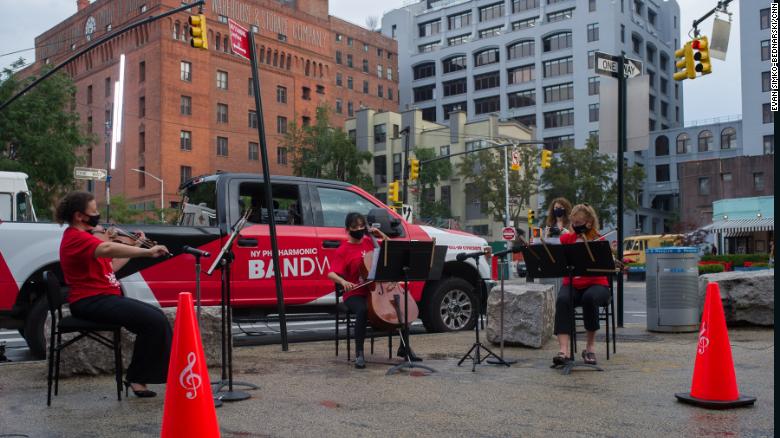Has anyone ever noticed that when you have a problem, it's very often a woman who comes up with a solution? Ms Borda came up with a winner.
As you've heard, New York was for a time the epicenter of the coronavirus in the US. In the six months since the dreaded virus came ashore here, more than 23,000 New Yorkers lost their lives from it. And since the spring, many of the city's restaurants, businesses, museums, and offices have been shuttered.
That includes Lincoln Center, where the Philharmonic played, but has not played since March. Ms Bonda came up with the idea for a bandwagon. She rented a Ford pickup, rigged up a sound system, rounded up staff and some musicians, and they tour the Big Apple's five boroughs, playing music where the people are, while the people can't come to where the music is.
"It's a little rough and ready," she admitted. "That's just typical New York."
'Forget everything and do what we do.''
This is a totally casual operation. They don't even announce where they will be parkin' and playin', so that the crowd size will stay low and social distancing, high. They only play for 15 minutes tops, to keep the crowds down.
"This is a way that we can connect with people," said Cynthia Phelps, the Philharmonic's principal violist. "It allows us to forget everything and do what we do."
"It gives us hope," violinist Yulia Ziskel said.
"We haven't played together since March," said cellist Sumire Kudo.
Recently, Anthony Roth Costanzo, noted countertenor with the Metropolitan Opera, grabbed a mic and joined the band in bed...uh, the bed of the truck...and gave the classical music version of "All right, Schenectady! Lemme hear you say yeah!"
"We're so excited to find you here in Brooklyn Bridge Park!" was what he said.
Three players performed a serenade in C major by Hungarian composer Ernst von Dohnányi, and then segued right into what Costanzo introduced as "the saddest aria"-- Henry Purcell's "Dido's Lament."
It's an appropriate song for that city, for our nation, for the world. Costanzo sang, "Remember me but forget my fate. Remember me but forget my fate."
"Those are powerful words," Costanzo said to the audience when the aria ended. "They stick in my head."

Borda also says that during the quick concerts, volunteers from the League of Woman Voters are signing people up to vote in the upcoming election.
The truck will make three stops a day on Fridays, Saturdays, and Sundays, and will eventually get to perform in all five boroughs.
"This is something we'll keep doing for a while," Ms Borda said.
Again: problem, woman, solution.

No comments:
Post a Comment